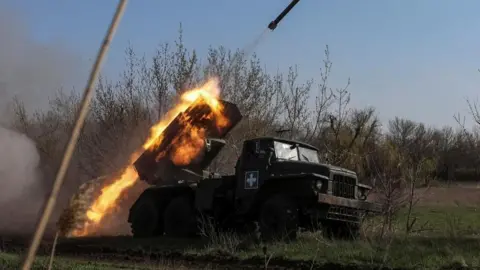European Nations Lead Record Aid Commitment as US Envoy Engages with Moscow on Potential Ceasefire
Ukraine's Western allies have pledged a record €21 billion ($24 billion) military support package, marking one of the largest coordinated aid efforts since Russia's invasion began. The announcement comes at a critical juncture as Russian forces intensify attacks and Western leaders express frustration over Moscow's reluctance to engage meaningfully in peace negotiations.
Key Developments in Military Support Package
The massive aid package, announced during the Ukraine Defense Contact Group meeting at NATO headquarters in Brussels, represents a significant escalation in European military assistance for Kyiv. Germany is providing the largest share, committing €11 billion over four years BBC News1.
British Defense Secretary John Healey, who co-chaired the meeting with his German counterpart, emphasized that the aid would be "surged to the frontline fight," addressing Ukraine's urgent battlefield needs AP News2.
The comprehensive package includes critical air defense systems, with Germany providing four IRIS-T systems with 300 missiles. This comes in response to Ukrainian President Volodymyr Zelenskyy's urgent appeal for additional Patriot systems following recent deadly Russian missile attacks The Guardian3.
"Our priority is air defense. Patriots that remained unused in storage with our partners should be protecting lives," Zelenskyy stated, adding that 10 more systems were urgently needed The Guardian3.
The UK and Norway are jointly contributing $580 million for hundreds of thousands of military drones, radar systems, anti-tank mines, and maintenance contracts for Ukrainian armored vehicles. Germany is additionally supplying 15 Leopard 1 tanks, 100,000 artillery rounds, and significant air defense assets BBC News1.
Global Reactions to Renewed Support Effort
Ukrainian Defense Minister Rustem Umerov described the meeting as "productive, effective and efficient," highlighting that it produced "one of the largest" assistance packages Ukraine has received AP News2.
Western officials expressed frustration with Russia's approach to peace negotiations. "Russia has to get moving" on the road to ending the war, U.S. President Donald Trump posted on social media, calling the conflict "terrible and senseless" AP News2.
Kremlin spokesman Dmitry Peskov downplayed expectations for any breakthrough in talks with U.S. Special Envoy Steve Witkoff, who traveled to Moscow to press for a ceasefire BBC News1.
Estonian Defense Minister Hanno Pevkur warned that Putin might try to grab as much territory as possible before May 9—the day Russia celebrates its World War II victory—potentially seeking a settlement that favors Moscow's position. "This is why we need to speed up the deliveries as quickly as we can," Pevkur urged The Guardian3.
Expert Insights on Strategic Implications
Military analysts point to the changing nature of the conflict, with drones playing an increasingly deadly role. "In our calculations, 70% to 80% of battlefield casualties are now caused and inflicted by drones," Healey noted BBC News1.
The massive aid package reflects a shift in burden-sharing among NATO allies, with European nations stepping up as U.S. priorities under the Trump administration have changed. This represents a critical evolution in the Western response to Russian aggression BBC News1.
Analysts from the UK-based International Institute for Strategic Studies have proposed three potential options for a future "reassurance force" to secure Ukraine following any peace agreement: a small-scale force of about 10,000 troops, a medium-scale option with 25,000 troops, or a more ambitious large-scale deployment of up to 100,000 soldiers Breaking Defense4.
However, plans for such a post-conflict security arrangement face significant challenges, as Finland insists on U.S. security guarantees while Washington has signaled it has no interest in placing American troops on Ukrainian soil Breaking Defense4.
Future Implications for the Ukraine-Russia Conflict
The substantial military aid package arrives at a pivotal moment, with Ukrainian officials and analysts believing Russia is preparing for a fresh offensive in the coming weeks to strengthen its negotiating position AP News2.
German Defense Minister Boris Pistorius emphasized that "Ukraine needs a strong military and only then can the negotiation process lead to a just and lasting peace" BBC News1.
The aid package is designed to address immediate battlefield needs while simultaneously laying groundwork for longer-term security arrangements. However, disagreements among allies about the scope and nature of post-conflict security guarantees indicate complex negotiations ahead Breaking Defense4.
Despite the record support package, questions remain about whether the aid will arrive quickly enough to counter Russia's numerical advantages and prevent territorial losses before any potential ceasefire negotiations advance The Guardian3.
A Critical Juncture in European Security
As Ukraine enters the fourth year of defending against Russian aggression, this unprecedented aid package represents both immediate battlefield support and a strategic statement about European resolve. The question now becomes whether this massive investment in Ukraine's defense capabilities will shift the military balance enough to force Moscow toward meaningful peace negotiations or merely prolongs a devastating conflict with no end in sight.



